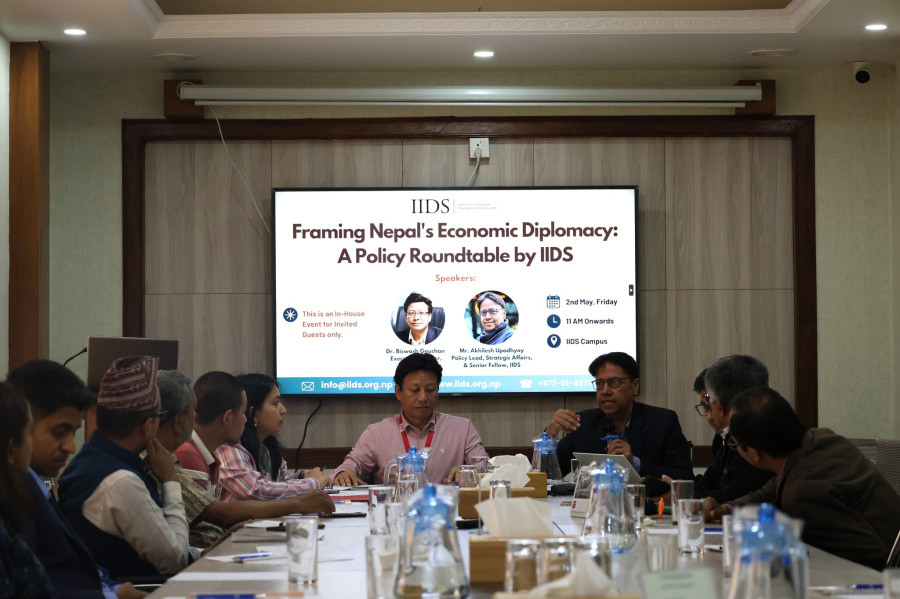Money
Experts urge Nepal to diversify economic diplomacy beyond India and China
Suggest a shift in focus toward a knowledge-based economy and prioritise the service sector for long-term development.
Post Report
Experts have emphasised an urgent need for Nepal to diversify its economic diplomacy beyond India and China, and to go further than its traditional focus on tourism and hydropower, in the country’s pursuit of sustainable economic development.
“Nepal suffers a triple deficit with India—trade, remittance, and capital. Nepalis working in India earn less than Nepal’s per capita income, while Indians working here earn more than their own per capita income. The same applies to China,” said Biswash Gauchan, executive director of the Institute for Integrated Development Studies, speaking at an interaction in Kathmandu on Friday.
He pointed out that although India allocates a budget for Nepal each year, only 24 percent of it is utilised. “On average, Nepal receives only IRs1.8 billion from the allocated amount, and even that is mostly spent on political gatherings as it is distributed through the Indian Embassy. It does not contribute significantly to development,” Gauchan said.
Gauchan also highlighted that although India pledged $1.4 billion for post-earthquake reconstruction, Nepal has received only one percent of it. Similarly, China committed Rs56 billion during President Xi Jinping’s visit to Nepal in 2019, but there has been no transparency or progress regarding the pledged support.
“These examples reflect the state of Nepal’s diplomatic ties with its immediate neighbours and demonstrate that focusing economic diplomacy solely on India and China will not lead to meaningful economic development,” he added.
Gauchan emphasised the need for Nepal to expand its economic diplomacy strategy to include other countries and sectors.
He suggested that Nepal shift its focus toward a knowledge-based economy and prioritise the service sector for long-term development. “Our resource allocation has been inefficient for years. It’s time for a major policy departure,” he said, stressing the need to move beyond the over-reliance on tourism and hydropower.
Participants in the programme also noted that Nepal’s economic diplomacy framework should remain stable regardless of changes in government.
They highlighted Nepal’s growing dependence on imported agricultural products and stressed the importance of self-reliance.
“Nepal has incurred a $1.8 billion trade deficit in agricultural goods over the past three years. We must harness natural resources rather than overprotect them to unlock their economic potential. While Nepal may not become an industrial powerhouse, the service export sector has tremendous potential, particularly due to our geography,” Gauchan said.
Experts suggested that to increase Nepal’s export volume from 3 percent to 10–15 percent, the country must focus on selling services rather than goods. Digital economy, they said, offers significant opportunities for Nepal.
Participants agreed that Nepal's economic diplomacy should be sector-specific rather than country-specific.
Kiran Sakha, president of the Nepal-US Chamber of Commerce and Industry, pointed out that although China granted duty-free access to 7,000 Nepali goods in 2012, Nepal has failed to take advantage of the facility. “Where is our diplomatic negotiation on this?” he asked.
Participants also criticised Nepal’s weak stance in economic negotiations and noted that many diplomatic officials lack financial expertise.
“We face high logistical costs when importing goods from Kolkata port, and the process is full of bureaucratic hassle. It can take up to six months to export goods to India. Exporters have been grappling with these issues for years, yet the government has failed to address them,” said Sakha. “Our major weakness is the inability to negotiate critical trade issues with India.”
Sakha also mentioned that the US provided duty-free access to 77 Nepali products under the Nepal Trade Preference Programme following the 2015 earthquake. Still, exports under this initiative have not exceeded 3 percent.
He stressed the need for the government to include the private sector in economic diplomacy negotiations.
Participants also questioned the rationale behind allowing the export of goods that Nepal does not produce in enough quantities, such as soybeans and betel nuts, by importing them first, warning that such decisions can damage Nepal’s trade relationships. They noted that these actions violate international trade regulations and hurt trading partners' industries.




 21.45°C Kathmandu
21.45°C Kathmandu














